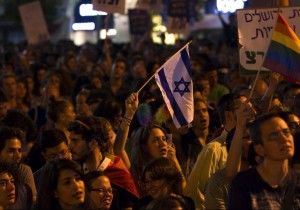Palestinians, on the other hand, claim that increased oppression by Israeli authorities – added to the significant increment in settler violence against them – results in more acts of resistance by increasing numbers of Palestinians. “Resistance” for the Palestinians includes individual actions against settlers or soldiers as well as organized armed cells which respond to Israeli military incursions into Palestinian villages, refugee camps, towns, and cities. They fight back or try to fight back against the mighty forces of the Israeli army.
Settler violence and Palestinian violence
Let’s face it, Palestinians otherwise have no official protection, neither against settler violence nor against the Israeli military forces. The Palestinian Authority security forces – the largest employer of Palestinians in the PA – have no ability to provide protection for Palestinian civilians. They cannot even protect themselves if the Israeli security forces decide to arrest them or shoot at them. No Palestinian today feels safe. No Palestinian parent can protect their children. No Palestinian can protect their property as witnessed by the settlers’ revenge attacks on villages in West Bank over the past weeks.
A majority of Palestinians support the use of violence against Israelis.Spiraling violence
This scenario of spiraling violence is exactly the strategy verbalized by the more right-wing elements in the Israeli government from the Religious Zionist Party and Otzma Yehudit Party, including the leaders of these parties who are senior ministers in the Israeli government.
Calls for a new military campaign like 2002’s Defensive Shield appear to seek the mass expulsion of Palestinians from their homes, especially from towns and villages which are next to Israeli settlements that those Israeli parties seek to expand rapidly. The plan seems to be to lead the Palestinians to pick up and leave, a scenario already being played out in large areas in the North and the South in Area C of the West Bank, lands which are entirely under IDF military and civilian rule. There are concerns from Washington as well as from the capitals of Europe about the out-of-control violence. Both the US State Department and the EU Commission and Parliament in Brussels are very good at putting out statements of condemnation and warning which are largely ignored by decision-makers in Jerusalem. The UN Human Rights Council and its new commission – the United Nations Independent International Commission of Inquiry on the Occupied Palestinian Territory, including east Jerusalem, and in Israel – have put together detailed reports on violence and human rights violations; mostly by Israel against Palestinians. Those reports have little impact on changing the reality on the ground.
If any of those bodies, the US State Department, the EU, or any UN body would propose that a commission of study or inquiry be sent to Israel and the PA to observe and document the violence (Palestinian and Israeli) and to even make recommendations, those study missions would not receive the support and assistance of the Israeli government.
Pressure from US and UN In any case, with the effective Israeli and Jewish pressure in Washington and with presidential elections on everyone’s minds, it is doubtful that the Americans would even think of proposing such an idea. It should be noted that Israel has always refused to cooperate with any UN body, including the UN Special Commission established in 2021.
THE SITUATION in the West Bank is dangerous and intolerable, and the violence has to be stopped, which is why I would like to propose a different idea and a challenge to the countries concerned. My proposal is that the Arab countries that are at peace with Israel send a commission of inquiry or study to Israel and the PA. The commission would include participants from the UAE, Bahrain, Jordan, Egypt, and Morocco. All of these countries maintain peaceful relations with Israel and have deep security and intelligence cooperation and coordination with the Israeli national security establishment. Some of these countries have strained relations with the PA – and some of them have no relations whatsoever with the Hamas government in Gaza. An all-Arab Commission of Inquiry regarding the violence in the occupied territories would send a message to the Palestinian people that the Arab countries remain concerned and active in the advancement of rights for the Palestinian people. It would also send a message to the Israeli people that its partners in peace are concerned about the welfare and safety of Israeli citizens as well. Furthermore, it would be politically very difficult for Israel to reject this Commission as it has done with other UN or EU commissions in the past. I believe that it would be possible for even Saudi Arabia to signal to Israel that it supports the commission and sees it as an important step toward the future of Saudi-Israel relations.
The need for this commission is immediate. Each day that the violence continues leads to the possibility of escalation and horrific events that we have witnessed in the past. We don’t want another Nakba (“catastrophe”) or a third Intifada.



